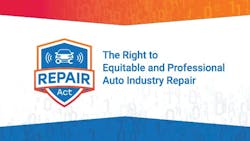Right to Repair gains federal support
Right to Repair legislation has again gained federal support with the reintroduction of the Right to Equitable and Professional Auto Industry Repair (REPAIR) Act, H.R. 906, by Congressman Neal Dunn (R-Fla.-02).
The bill is co-sponsored by Rep. Brendan Boyle (D-Penn.-02), Rep. Warren Davidson (R-Ohio-08) and Rep. Marie Gluesenkamp Perez (D-Wash.-03).
H.R. 906 will ensure consumers have access to data relating to their motor vehicles, critical repair information, and tools, and to provide them choices for the maintenance, service and repair of their motor vehicles.
Congressman Dunn is a member of the House Energy and Commerce Committee, which has responsibility for consumer protection matters, where the bill has been referred.
“When it comes to repairing their automobiles, consumers deserve options,” Dunn said. “The REPAIR Act would give owners, including the rural communities in my district, secure access to critical data so the service center of their choosing can replace parts and repair their vehicles.”
New vehicles require access to critical parts, tools, and repair and maintenance data to properly service and complete repairs and routine maintenance.
The REPAIR Act will accomplish this by:
- Ensuring vehicle owners and their repairers of choice have access to necessary repair and maintenance tools and data as vehicles continue to become more advanced;
- Ensuring access to critical repair tools and information to the independent repair industry, including all tools and equipment, wireless transmission of repair and diagnostic data, and access to on-board diagnostic and telematic systems needed to repair a vehicle;
- Ensuring cybersecurity by allowing vehicle manufacturers to secure vehicle-generated data and requiring the National Highway Traffic Safety Administration (NHTSA) to develop standards for how vehicle-generated data necessary for repair can be accessed securely;
- Providing transparency for consumers by requiring vehicle owners be informed that they can choose where and how to get their vehicle repaired;
- Creating a stakeholder advisory committee and providing them with the statutory authority to provide recommendations to the Federal Trade Commission (FTC) on how to address emerging barriers to vehicle repair and maintenance; and
- Providing ongoing enforcement by establishing a process for consumers and independent repair facilities to file complaints with the FTC regarding alleged violations of the requirements in the bill and a requirement that the FTC act within five months of a claim.
As vehicle technology continues to advance, the REPAIR Act will help to reduce access barriers when working on EVs as well.

